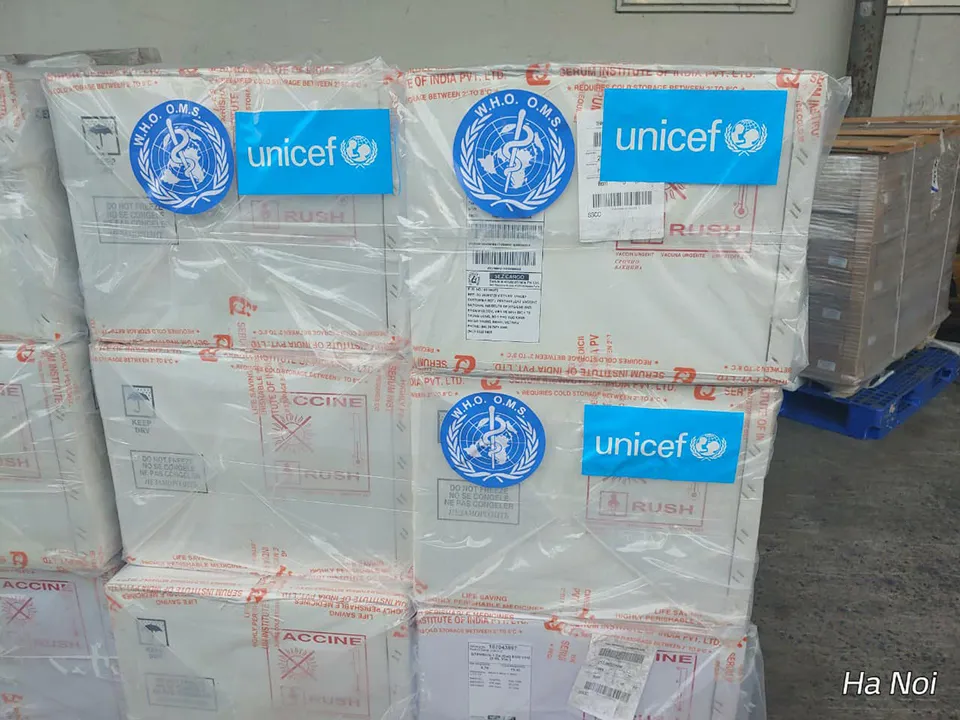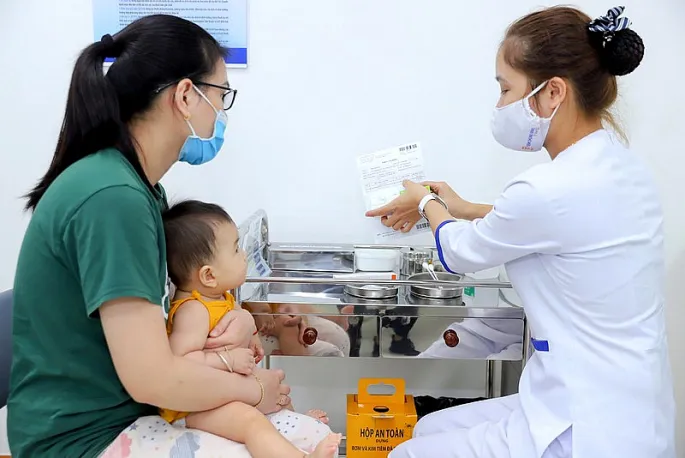WHO, UNICEF support Vietnam in routine childhood immunization
The Expanded Program on Immunization has been in place in Vietnam since 1981, with support from WHO and UNICEF.
The World Health Organization (WHO) and the United Nations Children's Fund (UNICEF) have supported Vietnam's efforts to catch up on routine childhood immunization by securing a supply of five-in-one vaccines to support the country's Vietnam’s expanded vaccination program.
A batch of 187,000 doses of the five-in-one vaccine arrived in Hanoi on July 27. Photo: UNICEF |
With the urgent goal of protecting children from life-threatening diseases, WHO and UNICEF welcomed the delivery of life-saving pentavalent vaccines to Vietnam on July 27. The vaccines (185,700 doses) were urgently provided to support the Vietnamese Ministry of Health in addressing low immunization coverage and a shortage of the five-in-one vaccine in the country.
The pentavalent vaccine protects against diphtheria, tetanus, pertussis (whooping cough), hepatitis B and Haemophilus influenzae type b (Hib). While many vaccines are now produced in Vietnam, the pentavalent vaccine must be purchased from approved overseas suppliers.
A child under one is vaccinated in a Hanoi healthcare center. Photo: Pham Hung/The Hanoi Times |
Rana Flowers, UNICEF Representative in Vietnam, stressed the importance of immunization, saying it saves the lives of millions of children around the world every year. Until the gap in routine immunization coverage is closed, children everywhere will remain at risk of contracting and dying from preventable diseases.
"WHO and UNICEF are proud to support efforts to urgently immunize children across Vietnam who have missed their vaccines while restoring and further improving immunization services to pre-pandemic levels," she said.
Dr. Angela Pratt, WHO Representative in Vietnam, expressed her delight that this donation of a five-in-one, or pentavalent, vaccine will be used to protect children in some of Vietnam's most remote and hard-to-reach communities. "We must do everything we can to ensure that every child who has missed a dose since the start of the pandemic is vaccinated. This will require ongoing, targeted catch-up campaigns and efforts to strengthen the system as a whole," Dr. Pratt added.
WHO and UNICEF have supported urgent efforts in Vietnam to reverse a significant decline in essential routine immunization, which has left many children unprotected against vaccine-preventable diseases. With the support of WHO and UNICEF, the Expanded Programme on Immunization has been implemented in Vietnam since 1981.
Vietnam's efforts
Like every other country in the world, Vietnam's routine immunization services in Vietnam were disrupted during the Covid-19 pandemic, resulting in an estimated 114,000 children under the age of one not receiving a dose of diphtheria, tetanus and pertussis vaccine in 2022, which is used as a global marker of immunization coverage.
In addition, due to the recent shortage of this vaccine in the country, a rough estimate of 300,000 children born in early 2023 have not yet received a dose of this essential vaccine. Unvaccinated children are at increased risk of death or prolonged serious illness from vaccine-preventable diseases such as diphtheria.
Large numbers of unimmunized children can lead to outbreaks of vaccine-preventable diseases. These risks threaten Vietnam's gains in reducing child mortality in recent decades.
It is important that the Government of Vietnam and the Ministry of Health continue their accelerated efforts and bold actions to overcome vaccine procurement challenges to ensure that essential vaccines reach every child in a timely manner, not only those who are due for immunization but also ensure that all children who have missed immunization due to the pandemic are reached.













